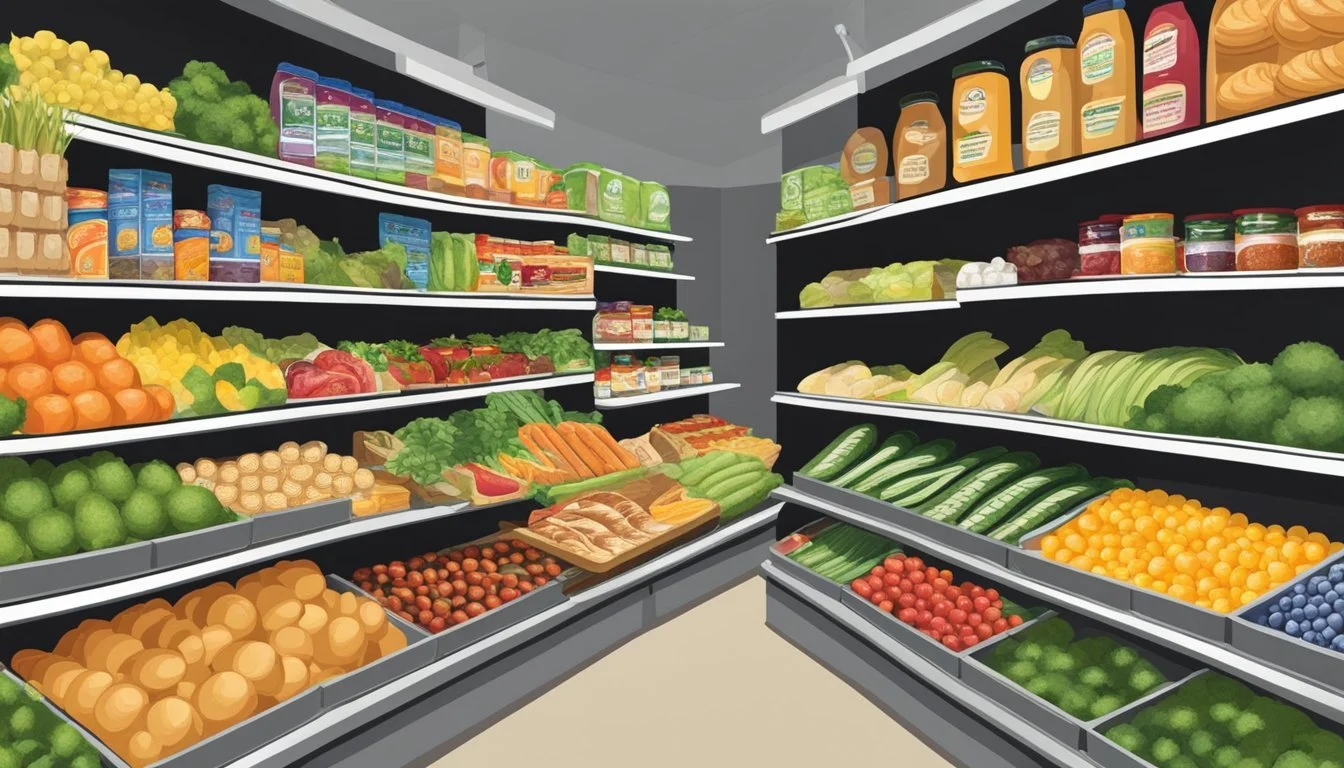Fresh, Affordable Groceries at DeMoulas Market Basket
New England's Favorite
Demoulas Market Basket stands as a prominent supermarket chain in New England, offering customers a diverse range of groceries and household essentials. With 90 stores spread across New Hampshire, Massachusetts, Maine, and Rhode Island, Market Basket has become a trusted name for shoppers seeking quality products at competitive prices.
Market Basket's commitment to providing "More For Your Dollar" has made it a go-to destination for budget-conscious consumers in the United States. The company's approach to value extends beyond just low prices, encompassing a wide selection of items and a focus on customer service that has earned them a loyal following in the region.
Shoppers at Market Basket can expect to find everything from fresh produce and meats to pantry staples and prepared foods. The chain's digital flyer and online shopping options have modernized the grocery experience, allowing customers to plan their purchases and even have items delivered through services like Instacart, adapting to changing consumer preferences in the digital age.
History of Demoulas Market Basket
Demoulas Market Basket's history spans over a century, marked by immigrant entrepreneurship, family leadership, and dramatic business challenges. The company's journey reflects the American dream and the complexities of family-owned enterprises.
Founding by Greek Immigrants
In 1917, Greek immigrants Athanasios ("Arthur") and Efrosini Demoulas established DeMoulas Market in Lowell, Massachusetts. Their small grocery store specialized in fresh lamb, catering to the local community.
The business thrived under their management, laying the foundation for future growth. Arthur and Efrosini's dedication to quality products and customer service became hallmarks of the company.
Expansion and Growth
In 1954, brothers Telemachus and George Demoulas purchased the original store from their parents for $15,000. This marked the beginning of rapid expansion for the company.
The brothers opened additional stores, transforming the single market into a growing chain. They introduced new store formats and expanded the product range to meet changing customer needs.
By 1967, the company had grown to 15 stores. The expansion continued steadily over the following decades, with the chain reaching 57 stores by 1997.
Family Ownership and Leadership
The Demoulas family maintained ownership and leadership of the company throughout its history. This continuity contributed to the company's consistent culture and values.
However, family leadership also led to internal conflicts. In the 1990s, a highly publicized dispute erupted between two branches of the Demoulas family over ownership and control of the company.
The conflict pitted Arthur S. Demoulas against his cousin Arthur T. Demoulas. This family feud resulted in legal battles and management changes that impacted the company's operations.
Significant Protests and Resolution
In 2014, Market Basket faced a major crisis when Arthur T. Demoulas was ousted as CEO by the board of directors controlled by Arthur S. Demoulas's side of the family.
This decision sparked unprecedented employee protests and customer boycotts. Workers and customers alike demanded Arthur T.'s reinstatement, demonstrating strong loyalty to his leadership style.
The protests lasted six weeks and severely disrupted the company's operations. The situation was resolved when Arthur T. and his allies purchased the company for $1.5 billion, regaining control.
This event highlighted the strong bonds between Market Basket, its employees, and its customers. It also demonstrated the impact of leadership on company culture and success.
Locations and Accessibility
Market Basket operates a network of supermarkets across New England, with stores strategically placed to serve communities in multiple states. The chain's locations and operating hours aim to provide convenient grocery shopping options for customers throughout the region.
Store Presence in United States
Market Basket's 90 supermarkets span four states in the Northeastern United States. Massachusetts hosts the majority of stores, including the company's headquarters in Tewksbury. New Hampshire claims a significant number of locations as well. Maine and Rhode Island round out the chain's coverage area.
The company's roots trace back to Lowell, Massachusetts, where the first store opened in 1917. While Market Basket has expanded across New England, it maintains a strong presence in its home state. The chain has not established stores in Vermont or on Cape Cod.
Accessibility and Hours of Operation
Market Basket stores typically offer extended hours to accommodate diverse customer schedules. Most locations open early in the morning and close late in the evening. This allows shoppers to visit before work, during lunch breaks, or after business hours.
Many stores operate seven days a week, providing consistent access for customers. Some locations may have slightly reduced hours on Sundays or holidays. Market Basket's website features a store locator tool, enabling customers to find nearby locations and check specific operating hours.
The chain's multiple locations within each state enhance accessibility for shoppers. This network of stores reduces travel time for many customers, making Market Basket a convenient option for regular grocery trips.
Shopping Experience
Market Basket stores offer a straightforward and efficient grocery shopping environment. The layout prioritizes functionality, while the staff focuses on providing attentive customer service.
Store Layout and Navigation
Market Basket stores feature a no-frills layout designed for easy navigation. Aisles are organized simply with clear signage directing customers to product categories. The stores emphasize groceries and essential household items, maintaining a focused shopping experience.
Wide aisles accommodate shopping carts and foot traffic, reducing congestion during busy periods. Produce sections are typically located near the entrance, followed by dairy, meats, and packaged goods.
Self-checkout options are available in many locations, offering a quick alternative for customers with smaller purchases. The streamlined layout helps shoppers find items efficiently and complete their trips promptly.
Customer Service Focus
Market Basket places a strong emphasis on customer service. Staff members are trained to be attentive and helpful, readily assisting shoppers with product inquiries or locating items.
The stores maintain adequate staffing levels to ensure short wait times at checkout counters. Baggers are often available to help customers pack their groceries efficiently.
Market Basket's commitment to customer service extends to its product selection and pricing. The chain strives to offer a wide variety of products at competitive prices, catering to diverse customer needs and budgets.
This customer-centric approach contributes to a positive shopping experience, fostering customer loyalty and repeat visits.
Products and Offerings
Market Basket offers a diverse range of grocery items to meet various customer needs. The store emphasizes quality and affordability across its product categories.
Fresh Produce and Organic Selection
Market Basket's produce section features a wide array of fresh fruits and vegetables. Seasonal offerings rotate throughout the year, ensuring customers have access to in-season produce. The store sources from local farms when possible, supporting regional agriculture.
Organic options are available for many popular items. These include organic apples, berries, leafy greens, and root vegetables. Market Basket aims to provide organic choices at competitive prices.
Pre-cut fruit and vegetable trays offer convenient options for shoppers. The store also stocks a variety of fresh herbs, enhancing cooking possibilities for customers.
Meat and Seafood
The meat department at Market Basket provides a range of options for shoppers. Fresh cuts of beef, pork, and poultry are available daily. The store offers both conventional and premium meat selections.
Fresh lamb is typically available, especially during holiday seasons. Market Basket's seafood counter features both fresh and frozen options. Fish fillets, shellfish, and prepared seafood items are commonly stocked.
The store emphasizes quality in its meat and seafood offerings. Trained butchers are often on hand to assist customers with special cuts or preparation requests.
Deli and Prepared Foods
Market Basket's deli counter offers a variety of sliced meats and cheeses. Customers can choose from pre-sliced options or request custom cuts. The deli also features prepared salads and side dishes.
Hot food bars are available in many locations, providing ready-to-eat meals. These often include rotisserie chickens, pasta dishes, and comfort foods. The selection may vary by store and time of day.
Prepared sandwiches and wraps offer quick lunch options. Market Basket also stocks a range of pre-made meals in the refrigerated section for easy dinners.
Dairy and Frozen Goods
The dairy section at Market Basket includes milk, yogurt, cheese, and eggs. Both conventional and organic dairy products are available. The store offers a range of plant-based milk alternatives to cater to different dietary needs.
Frozen foods cover a wide spectrum of options. These include frozen vegetables, fruits, meats, and prepared meals. Market Basket stocks both national brands and private label frozen items.
Ice cream and frozen desserts are prominently featured. The store offers various flavors and types, from traditional ice cream to non-dairy alternatives. Frozen pizza, appetizers, and convenience foods round out the frozen food selection.
Pricing and Savings
Market Basket is renowned for its competitive pricing strategy and commitment to customer savings. The supermarket chain offers various ways for shoppers to stretch their grocery budgets through low prices, weekly deals, and loyalty programs.
Competitive Pricing Strategy
Market Basket aims to be the lowest-priced chain in its markets. Their prices are consistently lower than average across all departments, including produce, deli, dairy, meat, and seafood. A Consumer Reports study found that Market Basket's prices were about 18% below the average supermarket.
This significant price difference can lead to substantial savings for customers. A family spending $250 weekly on groceries could potentially save over $2,300 annually by shopping at Market Basket.
The company's commitment to low prices has contributed to its popularity among budget-conscious shoppers. Market Basket's pricing strategy focuses on providing exceptional value to customers while maintaining quality products.
Weekly Flyer and Discounts
Market Basket publishes a weekly flyer showcasing current deals and promotions. This flyer is available online and in stores, allowing customers to plan their shopping trips around the best savings.
The flyer typically features:
Discounted prices on seasonal items
Multi-buy offers (e.g., buy one, get one free)
Department-specific sales (produce, meat, dairy)
Customers can maximize their savings by combining these weekly deals with other discounts and coupons. Market Basket's commitment to regular promotions helps shoppers get more for their dollar.
Loyalty Programs and Coupons
While Market Basket focuses on maintaining consistently low prices, they also offer additional ways for customers to save. The supermarket accepts manufacturer's coupons, allowing shoppers to stack discounts on top of already low prices.
Some Market Basket locations may participate in digital coupon programs or offer store-specific loyalty cards. These programs can provide:
Personalized discounts based on shopping habits
Points or rewards for frequent shoppers
Exclusive deals for loyalty program members
By combining low everyday prices with coupons and loyalty programs, Market Basket ensures customers can maximize their savings on every shopping trip.
Community and Tradition
Market Basket has deep roots in New England communities. The supermarket chain fosters strong customer loyalty through its commitment to local values and affordable prices.
Market Basket's Community Role
Market Basket stores serve as community hubs in many New England towns. The company prioritizes hiring local employees, often providing first jobs for teenagers and long-term careers for adults. Market Basket frequently supports local schools, sports teams, and charities through donations and sponsorships.
During times of crisis, Market Basket steps up to help. The chain has donated food to food banks and disaster relief efforts. Many stores stayed open during severe weather events to provide essential supplies to residents.
Market Basket's low prices make groceries more affordable for families on tight budgets. This commitment to value pricing has earned the loyalty of generations of shoppers.
Traditions and Customer Relations
Market Basket maintains many traditional practices that set it apart from other supermarket chains. Employees still carry groceries to customers' cars - a service rarely found elsewhere today. Many stores have on-site butchers who cut meat to order.
The company eschews loyalty cards and digital coupons in favor of consistently low prices for all shoppers. This no-frills approach resonates with many long-time customers. Market Basket also limits its advertising, relying instead on word-of-mouth recommendations.
Store managers often know regular customers by name. This personal touch helps foster a sense of community within Market Basket locations. The company's family ownership contributes to its reputation for treating both employees and shoppers like part of an extended family.
Market Basket News and Updates
Market Basket, the New England supermarket chain, has seen significant developments in recent years. In 2014, the company experienced a major ownership change that resolved a long-standing family feud.
Arthur T. Demoulas and his family completed the purchase of 50.5% of the company shares from his cousin Arthur S. Demoulas. This deal, valued at approximately $1.5 billion, solidified Arthur T.'s control over the business.
The ownership transition followed a period of turmoil within the company. Arthur T. had been ousted as CEO earlier in 2014, prompting widespread employee protests and customer boycotts in support of his return.
Market Basket has continued to expand its presence in the region. As of 2024, the chain operates 90 stores across Massachusetts, New Hampshire, and Maine.
In a recent business move, Demoulas, the parent company of Market Basket, acquired a property in Seekonk, Massachusetts. The deal, valued at $9.5 million, included the land where a Showcase Cinemas theater is located.
This acquisition suggests potential plans for further expansion or diversification of Market Basket's real estate holdings. It demonstrates the company's continued growth and investment in the New England area.







